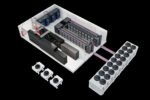Antoine Harb, Team Leader Middle East and North Africa for Kingston Technology explains how to protect your data privacy while accessing internet from the public Wi-Fi.
The convenience of using free public Wi-Fi hotspots has allowed many users to check their emails, keep up with their workflow, communicate with friends and family via video calls, read through the current trends, and more. Be it in an airport where you wait for your flight, in a coffee shop where you sip your favorite beverages, in a hospital where you wait for your appointment, or on public transit, there is a free Wi-Fi connection for everyone.
However, accessing free Wi-Fi networks has major risks regarding network security. There is a high probability that encryption on public Wi-Fi networks may not be enabled by default. This means that the data transferred between your system or smartphone and the router is not protected, and this allows scammers to access your web traffic to perform Wi-Fi snooping, sniffing, and Man in the Middle (MITM) cyber-attacks. These are severe attacks done with the help of special devices and software to eavesdrop on the Wi-Fi signals and track whatever you do online -even stealing your login credentials.
There is also the risk that public Wi-Fi networks are set up by cybercriminals and these are called malicious hotspots or rogue access points. These access points are set up within an existing network but without the knowledge or permission of the network administrator. Unfortunately, these kinds of wireless access points can easily trick users to believe that they are legitimate and safe to connect. And because of certain software vulnerabilities, hackers are also capable of injecting malware into your device.
It’s not surprising that public Wi-Fi networks aren’t really monitored or maintained by IT professionals because of their “free-to-use” and “open network” status, and these networks are positioned as high-risk categories. While users are advised to use good antivirus software, keep the OS up to date, activate two-factor authentication, access HTTPS-only websites, and use VPN software to access the web securely on public Wi-Fi, many are still unaware of the risks of connecting to a public Wi-Fi, since its more convenient for them to access the internet while traveling to avoid any roaming charges.
This is where having an encrypted hardware storage solution such as Kingston IronKey’s USB drives is an easy and secure way to access your personal and work-related sensitive data without the need to connect to any public Wi-Fi network. One might argue that today’s cloud storage offers the flexibility to access data from anywhere. But the truth is that there are still online flaws where hackers will be able to perform unlimited password attempts and exploit weaknesses to gain unauthorized access to your online storage.
Therefore, secure storage drives such as the latest Kingston IronKey Vault Privacy 50 have advantages. For starters, both IT administrators and users can set a read-only mode that protects the drive so malware cannot be copied to the device. And to enter the password, IronKey drives use a built-in virtual keyboard to evade the risk of keyloggers and screen loggers from capturing your credentials.
Speaking of passwords, the IronKey Vault Privacy 50 also offers users the option to use the complex password mode that is tough to guess, or the passphrase mode that is easy to remember. The passphrase can be a numeric PIN, a sentence with a set of spaces and special characters, or a list of words or lyrics that are between 10 to 64 characters long.
The IronKey Vault Privacy 50 is the FIPS 197 compliant secure drive with XTS-AES 256-bit based encryption standards that make it tougher to crack. To combat the latest threats, the drive comes with built-in protections against BadUSB and brute force attacks. The risk of BadUSB attacks is that any simple USB flash drive with a programmable microcontroller can be reprogrammed with malicious software. In an unfortunate event where there are attempts of brute force attacks, entering the incorrect admin password ten times in a row will force the drive to securely erase the data and ensure that your personal information does not fall into the wrong hands.
The sudden rise of cybercrimes around the world has resulted in heavy financial losses for both individuals and companies alike, it’s best to always ensure that you are securely accessing the internet – both at your home, office, and outside the premises.











